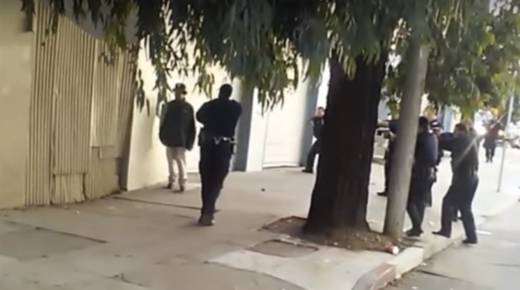Days before a trial was set to begin, the city of San Francisco has settled a wrongful death lawsuit arising from one of the most controversial officer-involved shootings in recent Police Department history.
The city attorney’s office announced Tuesday that an agreement had been reached with Gwendolyn Woods, who sued the city over the fatal 2015 shooting of her son Mario by a group of SFPD officers on a Bayview-Hunters Point street.
Details of the settlement, which must still be approved by the city’s Police Commission and Board of Supervisors, were not disclosed. But Woods’ lawyer, Oakland civil rights attorney John Burris, said the agreement allows his client to move on from a tragedy that was captured on cellphone video and provoked outrage when it was shared on social media.
“She is relieved about the resolution of the case — for her it means literally putting her son to rest,” Burris said.
Mario Woods, 26, was confronted the afternoon of Dec. 2, 2015, by officers who identified him as the suspect in a stabbing nearby. With a total of about a dozen officers on the scene, five opened fire when Woods disregarded repeated commands to drop a knife he was carrying and after pepper spray and less-lethal bean-bag rounds failed to subdue him.
Former Police Chief Greg Suhr told a community meeting after the shooting that officers shot Woods after he lunged at one of them, but the video evidence he cited appeared not to support that claim.
Officer Charles August, the first to open fire, said in a deposition for the lawsuit that when he confronted the suspect, Woods told him, “I’m not going with you.
“He presented the knife. I drew my firearm,” August testified. “I pointed it at him. And he said, ‘You’re going to have to squeeze that.'”
Toxicology tests later found that Woods had methamphetamine, cough medicine, antidepressants and marijuana in his bloodstream at the time of the encounter.
When August opened fire — he said he feared Woods posed a danger to bystanders and was close enough to stab or slash him — four other officers followed suit. Twenty rounds struck Woods.
The shooting was central to a series of events — including two more fatal police shootings, ongoing community protests and pressure from the late Mayor Ed Lee for reform in the Police Department — that led to Chief Suhr’s resignation in May 2016.
San Francisco District Attorney George Gascón announced in May 2018 that no charges would be filed against the officers involved in the case.
He called the shooting “disturbing” and “unnecessary,” but said the state’s legal standard for criminally charging police officers for on-duty use of force made it impossible to file charges in either case.
Last October, a federal judge cleared the way for a trial in the Woods lawsuit when he ruled that newly obtained video of the incident cast doubt on officers’ accounts of the shooting.
U.S. District Court Judge William Orrick ruled a jury should have the final say on the lawsuit’s negligence and wrongful death claims.
“Viewing the evidence in the light most favorable to the plaintiff, a jury could conclude that officers should have attempted more alternatives before shooting Woods,” Orrick wrote in his decision.
In announcing Tuesday’s settlement, city attorney’s spokesman John Coté said “any loss of life is tragic, and our condolences go out to the loved ones affected here.”
He added that the police officers in the Woods case were confronted with a “risky situation” and that their response “was consistent with their training and in accordance with the law.”
KQED’s Kate Wolffe contributed to this report.

